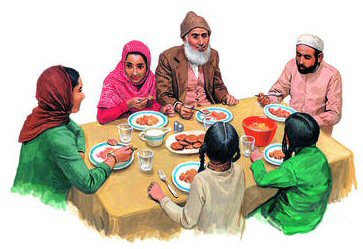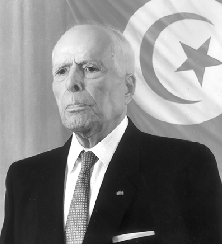“You neither eat nor drink the whole day?” Tan asked me.
“Yes. The whole day. But not at night. Only from dawn to sunset” I replied.
“How can you survive? Can you survive?” Tan asked again.
“Well, it’s not just you. Even Habib Bourguiba, the late President of Tunisia who was also a ‘Muslim’, convinced that fasting is against productivity. You know the history?” I took my turn asking Tan my question.
Habib Bourguiba
“How would I know? Tell me!” he said.
In 1961, Habib Bourguiba made a controversial statement claiming that fasting should not be observed for it reduces productivity. He then appeared on television with his cabinet, eating and drinking during Ramadhan.
“Why so harsh?” Tan was shocked.
“I don’t know. Was it out of ignorance or arrogance? Perhaps a combination of both” I replied.
Even though fasting is there in the name of Lent among Christians, it is always the Muslim’s version that cultivates questions and debates.
In order to understand about the real meaning of fasting, one should agree that it has something to do with our own paradigm and world view. The way we view things; like I always quote, “what you see is what you get”.
VIEWING FASTING IN MANY WAYS
If you see fasting as a way for better diet, you will benefit that from fasting. But fasting will only be a mechanism of improving your diet.
If you see fasting as a way to save your daily expense by breaking your fast daily in the mosque, then you will be able to achieve that. But that’s it. No more than that.
If you see fasting as a way for you to gain reward or ‘pahala’ from Him, then it is a good motive and sound intention. But reward and ‘pahala’ is something that you can hardly measure in this physical and worldly life. You don’t see someone obese out of pahala. It is something else!
And strangely, the last 10 days of Ramadhan are the most rewarded and full of pahala, but then you’ll see the mosques are empty.
So, what Ramadhan and fasting are all about?
If you see fasting as abstaining one from eating, drinking, having sexual intercourse during the daytime, and reducing the wrongdoings of backbiting what so ever… that is the definition of fasting. But it only explains the mechanism of fasting as ritual.
Let us take a look at the origin of Muslims’s version of fasting. Al-Quran says:
“O you who believe! Observing As-Saum (the fasting) is prescribed for you as it was prescribed for those before you, that you may become the people with the quality of Taqwa” (Al-Baqarah 2: 183)
Fasting is a mechanism to achieve Taqwa. You abstain yourself from eating and drinking, in order to achieve Taqwa. How is that?
TAQWA
Taqwa can be defined in many ways. But the conversation between Ubay bin Kaab and Umar al-Khattab was a good summary about the essence of Taqwa. Once, Umar asked Ubay what he knows about Taqwa. Ubay replied by asking him, “Have you walked through thorny path?”
Umar answered, “Yes, indeed”
Ubay then asked him, “What did you do?”
Umar replied, “I tucked up (my garment) and did my best (to avoid thorns)”
Thereupon Ubay said, “That is Taqwa!”
Our life is a journey. Like someone who is driving from a place to another. Throughout the journey, he will meet many road signs that might instruct him to do against his will. He wants to drive at full speed, but a sign says, “No, the limit is only 80km/h”.
He wants to arrive as early as possible but suddenly a red light instructs him to stop and let others move first.
Someone who is wise and on top of his rational thinking, would never ever see all the road signs as challenge to his right exercising his freedom. The truth is, the road signs are there to help him achieve safety throughout the journey until he reaches the destination.
The same thing applied to our big picture of this life. Do’s and don’ts of Islam are not the obstruction and challenge to the access of his freedom of choice. They come from the Creator who knows better what is good and what is bad in this life. They are there for our safety, peace and harmony.
Someone who has the quality of Taqwa will take his journey like someone who walks through thorny path. He is a person with a full of consciousness about what is good and what is bad around him. He must also have a good self control, like a person who is good in controlling his car steering.
This is the essence of fasting. You learn to exercise your self control.
SELF CONTROL
If someone does not take his lunch because there is nothing to eat, then it causes him tiredness and anger.
But a believer who chooses not to eat while he has everything to do so, for the sake of obeying his Lord, then he is exercising his ability to control himself against some of his desire.
You can eat, but you don’t eat. You can drink, but you learn not to drink, so that you can tell yourself that you are a proactive person. Not a reactive one.
A reactive person will get mad when something stimulates him to anger. He will be sad and out of control when something causes him sadness.
He has no ‘pause’ button. He has no ability to control himself to choose a better reaction. His actions are determined by things around him. He is not the one who controls himself. He is occupied by others. He is under the real occupation of others.
A Muslim is not an effective Muslim if he does not have a control over his own actions. He must be a proactive Muslim.
Return back you self control… you are the strongest!
Fasting makes us stronger, if we correct the way we view it.
Fasting is 30 days intensive training course for the 7 Habits of Highly Effective Muslim.
HASRIZAL @ www.saifulislam.com
43000 BSP
 Saifulislam.Com Pendidikan Jalan Islah
Saifulislam.Com Pendidikan Jalan Islah






A very great article to be shared ustaz. This could help me improving myself to be a better Muslim. May Allah bless. Ramadhan kareem! 🙂
Fully recharged by this great article!
I will be proactive from now on! Jazakallahu khair..
thank you ustaz, really benificient
i mean beneficial..hehe
Jazakallah khairan katheera, ustaz. May ALLAH grant us all infinite goodness and blessings in this blessed month.
Kurang understand, but nice comment, google translate